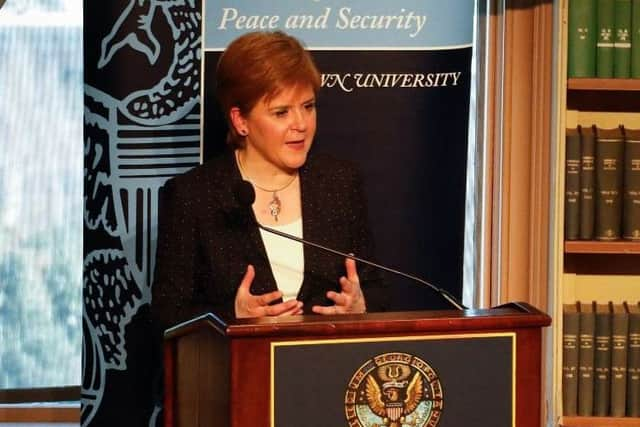Nicola Sturgeon plays down prospect of early Scottish independence vote
The SNP leader was asked about the timing of a second independence referendum during an interview with US broadcaster PBS yesterday.
“What that conclusion will be remains to be seen – and then take a decision based on a calm consideration of what’s in Scotland’s best interests.


Advertisement
Hide AdAdvertisement
Hide Ad“And that’s what I would do. So I’m not going to say right now what I think the best timing would be.”
The First Minister has pledged to update Scots on her plans for a second referendum, including the proposed timetable, in the coming weeks and before Brexit happens on 29 March.
But she made it clear the uncertainty surrounding the UK’s departure from the EU meant it would be wrong to rush into a second vote on Scotland’s future in the UK.
“Clearly, if people in Scotland are being asked, given the opportunity to look again at the independence question, they have a right to have as much information as possible about what, if Scotland chooses to be independent, what our relationships will be with the rest of the UK and with Europe,” she said.
“And some of the answers to those questions inevitably depend on the Brexit outcome to some extent. And, therefore, I think it’s in the interest of allowing an informed decision to be taken about independence that we allow some of that clarity to emerge.
“Brexit is a good example of what happens when people take, in some respects, an uninformed decision about a big change. And when people, as I believe they will in due course, opt for Scotland to be an independent country, that should be on the basis of a genuinely informed decision about implications and consequences.”
Senior MPs Angus MacNeil and Joanna Cherry have been among those pushing for an early second referendum during the meltdown at Westminster after MPs rejected the UK Government’s withdrawal deal, leaving a “no-deal” departure looking increasingly likely.
But former SNP deputy leader Angus Robertson called at the weekend for a new case for independence to be devised before another referendum is staged.
Advertisement
Hide AdAdvertisement
Hide AdDuring her visit to North America yesterday, Ms Sturgeon also signed a joint agreement with the governor of New Jersey Phil Murphy to tackle climate change. It follows the signing of a climate change agreement between Ms Sturgeon and governor of California Jerry Brown on a previous visit to the US in 2017.
The First Minister said: “We all have a moral responsibility to tackle climate change and the Scottish Government has set ambitious targets to reduce emissions and increase our electricity from renewable sources.
“Climate change is a global problem and agreements like these, working in partnership with like-minded administrations, will help us tackle the harmful effects it has on the planet. I look forward to working with New Jersey as we work towards our shared ambitions.”
New Jersey has developed an offshore wind initiative and has a goal of 3,500 megawatts (MW) of offshore wind energy by 2030.
Mr Murphy said: “As New Jersey progresses on the path to 100 per cent clean energy, we are grateful to partner with Scotland to tackle the issue of climate change head on. Scotland has a world-class offshore wind industry and we are looking forward to learning from them as we establish offshore wind farms in our state.”
The agreement commits Scotland and New Jersey to sharing experience and best practices on tackling climate change; working with like-minded countries, states and regions to increase ambition on climate change, and promoting business and economic opportunities created by the transition to a low- carbon economy.
